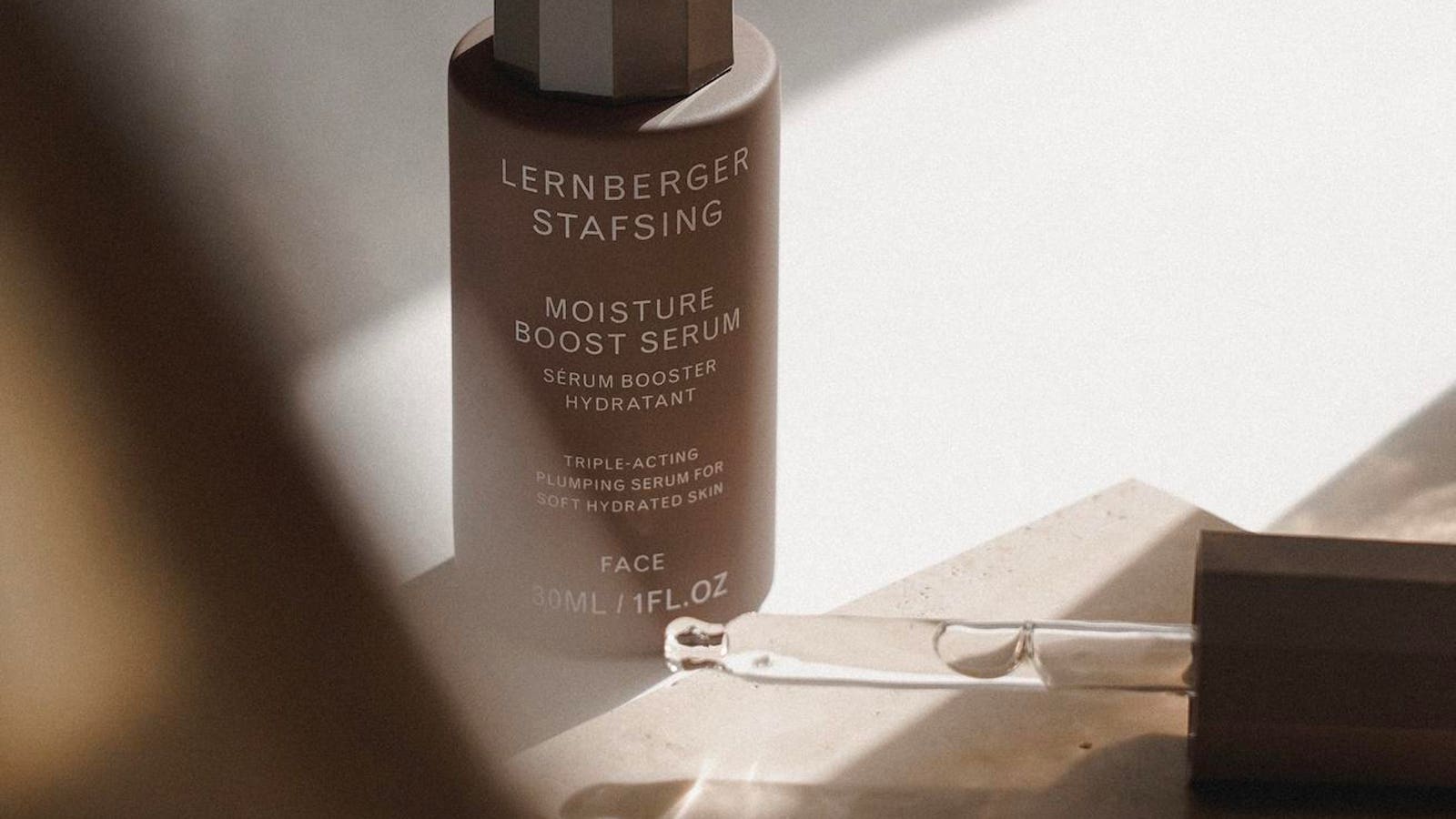
With the Sweden’s Arctic city of Kiruna named a European Capital of Culture for 2029, the world’s gaze is turning to the far north, where breathtaking landscapes, indigenous traditions, and cutting-edge beauty products converge. “Beauty is deeply emotional—it’s about desire, self-expression, and identity.” These words from Mattias Stafsing, Co-Founder of Lernberger Stafsing, capture the ethos driving Scandinavian beauty. Known for its high-performance hair, skin, and body products, Lernberger Stafsing epitomizes Sweden’s commitment to nature and minimalist elegance.
Lernberger Stafsing hair and skin care lines
Courtesy of Lernberger Stafsing
“Rebranding was essential for us to realign with the evolution of our brand’s identity and the changing, sustainability-driven, aspirations of our customers,” says Co-Founder Patrik Lernberger. This transformation reflects a broader Scandinavian trend: beauty that is both effective and conscious. Lernberger Stafsing’s products are free of micro-plastics, non-solvable polymers, and cyclic silicones, while manufactured entirely in Sweden in order to uphold their sustainability mission.
KIRUNA, SWEDEN – MARCH 7: The Aurora Borealis, commonly known as the Northern Lights, are seen in the sky above Kiruna on March 7, 2024 in Kiruna, Sweden. The area is widely regarded as one of the best places in the world to see the phenomenon, which occurs when energized particles from the sun hit the Earth’s upper atmosphere. (Photo by Leon Neal/Getty Images)
Getty Images
Scandinavian beauty’s rise is no accident. Johan Magnusson, a Stockholm-based expert in Nordic beauty and founder of the upcoming B2B platform Beauty Innovation, launching in 2025, attributes it to the region’s entrepreneurial spirit and values-driven culture. “This is the region that gave the world H&M, Spotify, and Byredo. A certain culture, societal support for startups, and visionary founders are driving this innovation,” he explains.
Why Scandi Beauty is Thriving
Scandinavian beauty rejects excess in favor of simplicity, aligning with global shifts toward “kind skincare” and holistic wellness. “To follow the K-Beauty 12-step routine feels outdated and unsustainable. Enter: the less-is-more-oriented Scandi beauty,” says Magnusson. In the Nordic philosophy, skincare products are often multi-use, blending functionality with luxury, think luxurious, yet minimalist packaging and product bottle design.
The proximity to nature also shapes the region’s approach. Brands like Finland’s Lumene use Arctic water, local berries, and upcycled ingredients to create products of almost entirely natural origin. The emphasis on clean, minimalist formulations speaks to a growing global demand for transparency and sustainability. “Scandinavia is a leader in fields relevant to beauty in 2025. Consumers demand transparency, sustainability, and authenticity, which pushes brands to innovate,” Magnusson notes.
This ethos is echoed by Denmark’s Rudolph Care, whose bestselling Acai Facial Oil combines luxury with eco-consciousness. Meanwhile, brands like Sweden’s Oquist Cosmetics are pioneering waterless formulations, reducing their carbon footprint and eliminating preservatives.
Scandinavian beauty brands are also setting their sights on international markets, particularly the United States. “The US offers endless opportunities,” says Magnusson. “For many, it’s the ultimate goal—a window opener and proof of concept. With a unique flora of local ingredients and a mantra of growth beyond borders, Nordic brands are ready to make their mark.”
Beyond market potential, the appeal lies in offering an alternative to the U.S.’s “clean beauty” movement. “The EU has the world’s strongest beauty regulations. While ‘clean beauty’ is loosely defined, European standards focus on sustainability, emissions, and natural ingredients,” Magnusson explains. This approach aligns with increasing consumer demand for ethical luxury.
Scandinavian Brands Redefining the Beauty Landscape
Lernberger Stafsing (Sweden)
Lernberger Stafsing is a Swedish beauty brand celebrated for its fusion of natural ingredients and advanced technology, delivering high-performance haircare and skincare products.
Lernberger Stafsing hair and skin care lines
Courtesy of Lernberger Stafsing
With a strong focus on sustainability and clean formulations, the brand champions environmentally conscious beauty without compromising on quality. Known for its sleek Scandinavian design and commitment to enhancing natural beauty, Lernberger Stafsing has become a trusted name for those seeking effective, modern solutions.
Rudolph Care (Denmark)
Rudolph Care is a Danish beauty brand specializing in eco-certified skincare and haircare products that balance sustainability with high-quality performance.
Rudolph Care firming beauty products
Courtesy of Rudolph Care
The brand emphasizes the use of organic and natural ingredients, aligning with its commitment to environmental responsibility. Known for its minimalist approach and focus on effective formulations, Rudolph Care appeals to consumers seeking mindful and reliable beauty solutions.
Raaw Alchemy (Denmark)
Raaw Alchemy was born from Trice Angie Christiansen’s personal skincare struggles. Her research into herbal medicine resulted in Miracle Oil, the cornerstone of a brand that emphasizes potent, natural formulations crafted in small batches to ensure sustainability.
Raaw Alchemy beauty and hair products
Courtesy of Raaw Alchemy
Bagliora (Sweden)
Founded by sister-in-laws Jessica Lundström and Julia Fors, Bagliora combines superfood ingredients like antioxidants and omega fatty acids with eco-conscious production methods. The result is indulgent skincare that doesn’t compromise on responsibility.
Bagliora cooling eye patches
Courtesy of Bagliora
Oquist Cosmetics (Sweden)
The father-daughter duo behind Oquist Cosmetics is transforming beauty with waterless products in terracotta packaging made in Lithuania. Their award-winning 6-in-1 Anti-Aging Serum is a standout, offering visible results with minimal environmental impact.
Oquist Cosmetics
Courtesy of Oquist Cosmetics
Meishai (Denmark)
Katja Rosasco’s Meishai blends salon-quality haircare with allergy-safe formulations. Certified by Asthma Allergy Nordic, Meishai proves that luxury and safety can coexist seamlessly.
Katja Rosasco’s Meishai blends salon-quality haircare with allergy-safe formulations.
Courtesy of Meishai
Bodyologist (Denmark)
Bodyologist’s “Treat your body like your face” mantra challenges traditional beauty norms. As a B Corp, the brand merges advanced skincare technology with ethical sourcing, redefining body care with simplicity and elegance.
Calming Crystals from Bodyologist
Courtesy of Bodyologist
As Scandinavian beauty continues its global expansion, its philosophy remains rooted in authenticity, sustainability, and innovation. With a growing focus on transparency and wellness, these brands are setting new standards for the industry. “You better learn the pronunciation of our local brands,” Magnusson jokes, “because we’re not going anywhere.”
